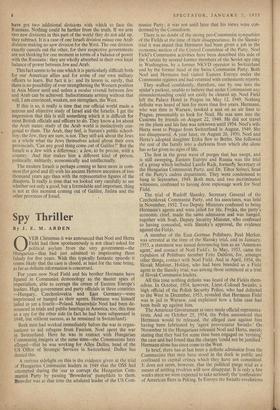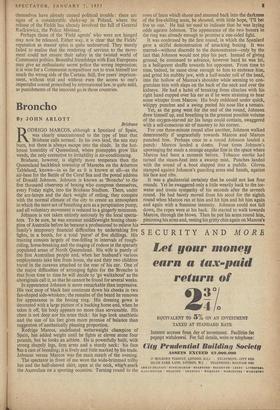Spy Thriller
By J. E. M. ARDEN OVER Christmas it was announced that Noel and Herta Field had (how spontaneously is not clear) asked for political asylum from the very government—the Hungarian—that had just admitted tb imprisoning them falsely for five years. With this typically fantastic episode it seems likely that the case is closed, at least for the time being, as far as definite information is concerned.
For years now Noel Field and his brbther Hermann have figured in Communist demonology as the master spies of imperialism, able to corrupt the cream of Eastern Europe's leaders. High government and party officials in three countries —Hungary, Czechoslovakia and East Germany—were imprisoned or hanged as their agents. Hermann was himself jailed in yet a fourth—Poland. Meanwhile Noel had been de- nounced in trials and public hearings in America, too, this time as a spy for the other side (in fact he had been subpoenaed in 1948, but without success, as he remained in Switzerland).
Both men had worked immediately before the war in organ- isations to aid refugees from Fascism. Noel spent the war in Switzerland. Here he was in contact with Hungarian Communist emigres at the same time—the Communists later alleged—that he was working for Allen Dulles, head of the US Office of Strategic Services in Switzerland. Dulles has denied this.
A curious sidelight on this is the evidence given at the trial of Hungarian Communist leaders in 1949 that the OSS had attempted during the war to corrupt the Hungarian Com- munist Party by passing 'Browderist' pamphlets to them. Browder was at that time the adulated leader of the US Corn- munist Party; it was not until later that his views were con- demned by the Cominforin.
There is no doubt of the strong pro-Communist sympathies of the Fields at the time of their disappearance. In the 'Slansky trial it was stated that Hermann had been given a job in the economic section of the Central Committee of the Party. Noel Field's Communist activities have been described this side of the Curtain by several former members of the Soviet spy ring in Washington, by a former NKVD operator in Switzerland and by the former head of the Swiss Communist Party. Both Noel and Hermann had visited Eastern Europe under the Communist regimes and had returned with enthusiastic reports.
They walked confidently, therefore, one by one into the spider's parlour, unable to believe that under Communism any misunderstanding could not easily be cleared up. Noel Field left the Palace Hotel in Prague on May 12, 1949. Nothing definite was heard of him for more than five years. Hermann, who was then in Warsaw, booked a seat on an air liner to Prague, presumably to look for Noel. He was seen into the Customs by friends on August 22, 1949. He did not travel on the plane and his fate was unknown until 1954. Noel's wife Herta went to Prague from Switzerland in August, 1949. She too disappeared. A year later, on August 26, 1950, Noel and Herta's adopted daughter Erika flew to Berlin. She followed the rest of the family into a darkness from which she alone has so far given.no signs of life.
The first in the great wave of purges that has swept, and is still sweeping, Eastern Europe and Russia was the trial of a group which included Laszlo Rajk. formerly Secretary of the Hungarian Communist Party, and Dr. Tibor Szonyi, head of the Party's cadres department. They were condemned to hang in September, 1949. Both men, and two incriminated witnesses, confessed to having done espionage work for Noel Field.
The trial of Rudolf Slansky, Secretary General of the Czechoslovak Communist Party, and his associates, was held in November, 1952. Two Deputy Ministers confessed to being Hermann's agents and were jailed for life. Frejka, the party's economic chief, made the same admission and was hanged, together with Svab, Deputy Security Minister, who confessed to having concealed, with Slansky's approval, the evidence against the Fields.
A member of the East German Politburo, Paul Merkel', was arrested at the time of the Slansky trial, and in January, 1953, a statement was issued denouncing him as an 'American agent,' and contact of Noel Field's. In May, 1953, came the expulsion of Politburo member Fritz Dahlem, for, amongst other things, contact with Noel Field. And in April, 1954, the Slovak Minister, Holdos, who had been branded as a Field agent in the Slansky trial, was among those sentenced at a trial of Slovak-Communist leaders.
All this time nothing definite was heard of the Fields them- selves. In October, 1954, however, Lieut.-Colonel Swiatlo, a high official of the Polish Security Police, who had defected to the West in December, 1953, revealed that Hermann Field was in jail in Warsaw, and explained how a false case had been built up against him. The American Government at once made official representa- tions. And on October 25. 1954, the Poles announced that Hermann would be released, the alleged case against him having been fabricated by 'agent provocateur Swiatlo.' On November 16 the Hungarians released Noel and Herta, merely stating that they had for some time been engaged on 'revising' the case and had found that the charges 'could not be justified.' Hermann alone has since come to the West.
In brief, there has at last been a definite admission from the Communists that men have stood in the dock in public and confessed to capital crimes which they have not committed. It does not seem, however, that the political purge trial as a means of settling rivalries will now disappear. It is only a few weeks since we were expected to take seriously the 'confessions' of American fliers in Peking. In Europe the Swiatlo revelations themselves have already caused political trouble : there are signs of a considerable shake-up in Poland, where the release of the Fields has already involved the fall of General Radlciewicz, the Police Minister.
Perhaps those of the 'Field agents' who were not hanged may now be released. Either way, it is clear that the Fields' reputation as master spies is quite undeserved. They merely failed to realise that the rendering of services to the move- ment could not ensure their safety in the twisted world of Communist politics. Beautiful friendships with East Europeans may give an enthusiastic secret police the wrong impression; it is wise for a Communist sympathiser not to trust himself too much the wrong side of the Curtain. Still, five years' imprison- ment, without trial and without even the access to one's imperialist consul prescribed by international law, is quite mild, as punishments of the innocent go in those countries.















































 Previous page
Previous page